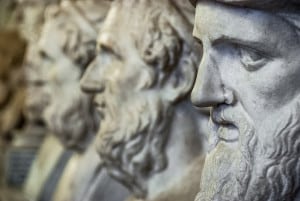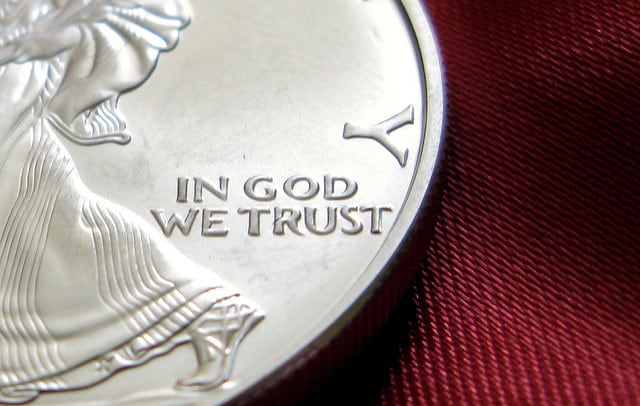They always looked a little puzzled. My former students did not expect a young man studying for the priesthood to ask them questions like: Does God exist? How do you know? Does my believing in God make God exist? And, if my friend doesn’t believe in God, does God not exist just for her? The famous atheist Bertrand Russell was fond of saying that if God does exist, he hasn’t given us enough evidence.
But where do we look for such evidence? Would we recognize it, if it were on offer?
* * *
I read with interest William Irwin’s thoughtful piece “God Is a Question, Not an Answer” on the New York Times’s philosophy blog, “The Stone.” In it, Irwin stumbles through the fog of God-talk by admitting a skepticism about conclusive answers:
Some 70 years [after Albert Camus’s The Stranger], Kamel Daoud, in his 2013 novel “The Meursault Investigation,” picks up the thread of Camus’s story. In one scene late in that novel, an imam hounds Harun, the brother of the unnamed Arab who was killed in The Stranger. In response, Harun gives a litany of his own impieties, culminating in the declaration that “God is a question, not an answer.” Harun’s declaration resonates with me as a teacher and student of philosophy. The question is permanent; answers are temporary. I live in the question.
“The question is permanent, answers are temporary. I live in the question.” (O tempora, o mores!) I must admit: I find this skeptical turn-of-phrase attractive, with its poetic flourish of authenticity at the end. (What rarified airs we breathe, floating into intellectual stratospheres that most people heretofore were incapable of reaching!) Irwin doubts not just the answers about who God is, but about the possibility of whether we can say anything about “God.” He continues, “Dwelling in a state of doubt, uncertainty and openness about the existence of God marks an honest approach to the question.”
But how honest is Irwin’s approach? He intends to problematize – scratching his head and wringing his hands — the question of God’s (un)reality: “God? But how…?” It is as if the only honest posture is a noble skepticism, which admits to the possibility of reliable belief. But why should anyone bother with entertaining belief at all? Perhaps out of some nostalgia — or worse, pity — for when people could more easily believe in God? Perhaps to hedge our skeptical bets? Perhaps, with Russell, we are holding out for more evidence…
* * *
 For most people in the course of history, spectatorial skepticism about God’s reality has not been the default, common intellectual posture. It has instead been – at least since the times of the ancient Greeks – the posture of thinkers who have enjoyed lives of relative comfort and leisure. (Such is the basis of culture and philosophy; this is not intended as a slight, but an observation.)
For most people in the course of history, spectatorial skepticism about God’s reality has not been the default, common intellectual posture. It has instead been – at least since the times of the ancient Greeks – the posture of thinkers who have enjoyed lives of relative comfort and leisure. (Such is the basis of culture and philosophy; this is not intended as a slight, but an observation.)
Certainly, we all may struggle to find God in the midst of personal toil and difficulty. But how many people in the world enjoy the ample time needed to ponder at length whether God exists, detached from the raw data of our lives?
Very few, I suspect; which is why I have trouble accepting Irwin’s claim, that “The question is permanent, answers are temporary. I live in the question.” His declarative statements have a too-serious finality to them, with full-stop periods and grave pause. Irwin declares, finally and resolutely, that we can declare precious little about God.
* * *
And yet, perhaps this is precisely missing the point — God is not a remote question, but the answer to life’s incongruities, clamoring for our attention. Enter Christian Wiman, a poet/writer whose reconsideration of religious belief emerged from his serious bout with cancer. Despair about God happens not from life’s most difficult circumstances, Wiman writes, but from the day-to-day boredom that besets us in our comfort:
“Religious despair is often a defense against boredom and the daily grind of existence. Lacking intensity in our lives, we say that we are distant from God and then seek to make that distance into an intense experience. It is among the most difficult spiritual ailments to heal, because it is usually wholly illusory.”
Even for us who write at the Jesuit Post, many times it has proven easier to think about the question of God, rather than to treat God as an interlocutor worthy of relationship, of time in prayer. Indeed, musing about God — like I’m doing right now — appears to be an intellectually serious posture. And so we go around and around in our head with the question of belief, rather than submitting to the vulnerability required for honest conversation or a second opinion on how — and why — we are living as we do. Wiman continues,
“There are definitely times when we must suffer God’s absence, when we are called to enter the dark night of the soul in order to pass into some new understanding of God, some deeper communion with him and with all creation. But this is very rare, and for the most part our dark nights of the soul are, in a way this is more pathetic than tragic, wishful thinking. God is not absent. He is everywhere in the world we are too dispirited to love. … All too often the task to which we are called is simply to show a kindness to the irritating person in the cubicle next to us, say, or to touch the face of a spouse from whom we ourselves have been long absent, letting grace wake love from our intense, self-enclosed sleep.”
Imagine – if you will — that God indeed exists, and is altogether amused by our uneven ponderings about whether God exists. Imagine a further question, which makes a discomforting claim on life: “If God does exist after all, how do my life and thinking need to adapt?”
In other words, if God is the Question, how can my life become the answer?
–//–
Title image, “In God We Trust,” is available from Flickr user Kevin Dooley here.
“Philosophers” available from Flickr user Stijn Nieuwendijk here.


